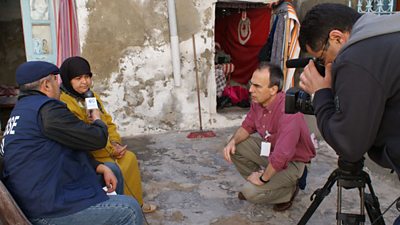Downloads
±«Óătv Media Action surveyed a nationally representative sample of 1,000 Tunisians in June 2013. The results show that Tunisian audiences believe that the media is better at holding leaders to account than the judiciary. Tunisians want the media to question government officials but do not want to play an active role in this by interacting directly with the media.
Publication date: September 2013
As part of the British Foreign and Commonwealth Office’s Arab Media Partnership fund, ±«Óătv Media Action works with the national broadcaster TĂ©lĂ©vision Nationale Tunisienne (TTV) in its transition to a public service broadcaster.
Over a 24-month period this is taking the form of support for the production of audience participation programmes to a high editorial standard through targeted training and development. Programmes cater for currently under-represented audiences (such as marginalised and unemployed youth and women), enabling them to participate fully in the democratic transition.
Research approach
In June 2013, ±«Óătv Media Action surveyed 1,000 Tunisians aged 15+ about their media use, including of TTV, and their views on governance in Tunisia. Our analysis of this data provides insight into audience attitudes and media consumption habits, supporting ongoing programme development.
“Over two thirds of the audience reported that if there was a way to question government officials they would.” - ±«Óătv Media Action
Key findings
- Over half (54.7%) of Tunisians agree that traditional media (TV, radio and newspapers) is playing an important role in holding leaders to account. People rated it more highly than any of the other institution, including the judiciary system, which came second at 49.9% agreement.
- Only 17% of Tunisians are satisfied with the account that government officials currently give of their decisions and actions. Sixty-eight per cent agree that if there was a way to question government officials they would raise an issue that mattered to them. Yet most people do not contact the media.
- TV remains the top source of information in Tunisia for political issues and current affairs (cited by 83% of Tunisians). The second most popular source was friends at 50% followed by family at 43%. However only 51% of people trust TV as a source compared to 77% who trust friends/family.
- The top reason cited for specifying a favourite television programme is that it is “useful for society” (42%).
Project context
In the second year after the formation of the new government, the media environment in Tunisia is still a mix of old and new – a great deal of media laxity or an “overdose of freedom of expression” and government interference. Yet both the public and professionals want to reform the media and a make a definitive break with the past. ±«Óătv Media Action’s programme with the TTV aims to build on this desire for change and support TTV in developing public service broadcasting.
The survey provided new data about media access and consumption in Tunisia. Ninety-nine per cent of households have at least one TV and of these, 88% access TV at least once a day. In terms of new media, the survey found that 92% of Tunisian households have at least one mobile phone and of these, 86% use their mobile phone at least once a day. Twenty-nine per cent of Tunisian households have access to at least one desktop computer, and 34% have access to at least one laptop computer. Thirty per cent of Tunisians used the internet “today or yesterday” and 60% access the internet at least once a day.
Implications and impact
The findings from the nationally representative survey highlight the potential for television to make a difference. Television remains the most important source of information on politics and current affairs for Tunisians, but trust in television is low. As such, work that addresses the challenges of trust and credibility in Tunisian television channels is key.
The research highlights that there is a real demand for programming that addresses social issues. When asked what kind of programmes they would like to see more of on national television, the largest number of people said that they would like to see more social programming. Being “useful for society” was also an important criteria identified by the audience for a programme to be appreciated.
The survey found that the majority of Tunisians (93.5%) do not contact the media about the issues that matter to them. The main reason given for this, provided by nearly a third of people (32.9%), was the opinion that contacting the media “will not make a difference”. Finding a way to change this perception is vital if the media is going to represent Tunisians.
The Tunisian audience felt that the media was better than any other Tunisian institution at holding leaders to account, yet despite this there was a low level of satisfaction with the accounts given by leaders. Over two thirds of the audience reported that if there was a way to question government officials they would. By harnessing this collective desire, and finding a way to increase the willingness of the Tunisian audience to contact them, the media in Tunisia could continue to hold the government to account and provide the audience with what it wants.
